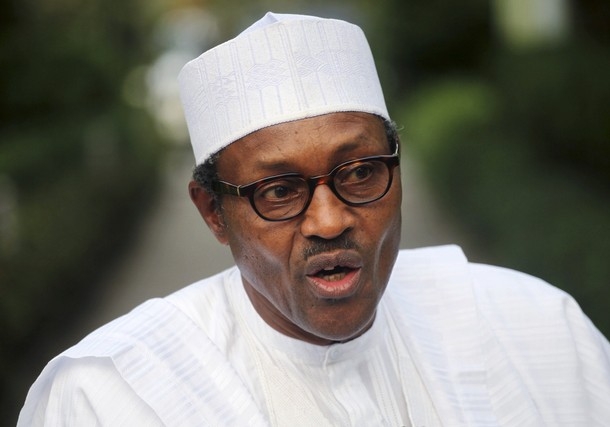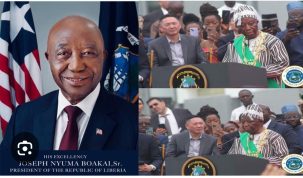President Buhari promised change, and thank God, he is delivering. Reports, stories and rumous are churning that the Federal Government is searching for, finding and recovering huge sums of public money stolen and hidden away by high public officials, that some public officials are being held for corruption interrogation, and that panic is mounting among former public officials. The U.S. government and some other foreign governments are reported to be offering to help Buhari to find Nigeria's stolen money. Buhari and his Vice-President have slashed their salaries in half, and some state governors have followed suit – and even the National Assembly is reported to be thinking of doing so too.
All this, however, is change on the surface – the kind of change that Buhari is familiar with from his former stint as military ruler. He will need soon to get into real and fundamental change. He will need soon to begin to deal with the fundamental corruption that has been ruthlessly destroying our country. The fundamental corruption, the mother of corruption, in Nigeria is the stealing of all resources in our country and putting them all in the hands of the Federal Government. Most of the disaster was wrought by the military dictatorships from 1966-99.
The greed of the controllers of the Federal Government to control the Niger Delta oil started the disease. And then, it was decided to seize control of all other resources. And so, decree followed upon decree vesting all of Nigeria’s coastal lands in the Federal Government, then land along all waterways, then agricultural export produce, then VAT (value-added tax) collected from businesses operating in the states – and on and on and on.
In the outcome, the Federal Government became a ponderous and hideously corrupt establishment throwing funds around in a sickening frenzy, spreading corruption everywhere, interfering with, obstructing and disrupting state government functions, destroying state and local development initiatives, wrecking the integrity of all agencies of governance (police, security services, electoral commission, even the military and the courts), insensitively promoting poverty all over our country and, above all, employing its massively corrupt influence to frustrate any kind of change.
And what have been the consequences of this mother of corruptions?
Elections have become federal wars against the people of Nigeria. The police, courts and even the military are riddled and paralyzed with corruption. Schools, colleges and universities across our country have drastically lost quality as givers of education – and even many of our university graduates are hardly literate these days. Disregarded and demoralized, the servants of our educational system have more or less given up the struggle for quality education. We have lost most of our world market share in such crops as cocoa, palm produce, groundnuts, gum-arabic, etc, exports that used to spread money out to our farmers. Deprived of the regional support systems that had maximized them in the 1950s, our coca exports fell by half from 1965 to 1980, our groundnut exports fell from 765,000 tons in 1968 to only 25,000 tons by 1973, our palm produce, cotton and gum-arabic exports virtually disappeared. An author has written that from about 1970, tropical Africa regularly lost about $70 billion per annum in export earnings, and that much of that was Nigeria’s.
Many of the industries ambitiously established by our governments in the pre-independence years have closed their doors. In large parts of our country, farming has weakened sharply, with the result that we are a large importer of food. In most parts of our country, the spirit of enterprise has vanished, with most citizens hustling for some share in the revenues generated by the oil of the Niger Delta. By 2011, the Nigerian National Bureau of Statistics announced that 60.9% of Nigerians were living in a state of “absolute poverty”. Unemployment among Nigerian youths is believed to be one of the highest in the world. Various kinds of violent crimes have turned Nigeria into one of the most unsafe places in peace time in the world.
The Nigerian picture is filled with grotesque facts and stories. Here are a few.
Some months ago, Nigeria saw the spectacle of a federal minister marching troops to Lagos State to stop workers on a Lagos state project – because, according to the minister, the sea-side location of the project was federal property. A small local company in Osun State was dredging sand near a local river for a local construction job; and federal officials went there to stop them and to tell them that, to be able to get the sand, they must apply to Abuja for a license.
The Niger Delta produces most of the revenues upon which all the Nigerian empire of corruption rests; but the states of the Niger Delta are about the most neglected and most brutalized in Nigeria. After the states of the Niger Delta, Lagos State commands the richest resources and revenues in Nigeria. From VAT alone (value-added tax on businesses operating in Lagos), Lagos State earns hundreds of billions of Naira per annum; but the Federal Government takes it all and later sends back a little part of it – meaning that the Federal Government is robbing Lagos heavily every year.
Droughts and the expanding desert have been blasting our cattle-herding folks in the far North for decades. Many who have lost their cattle have become gangs of cattle thieves, and their attacks on the rest, together with losses of grazing land, have been pushing large numbers of cattle herders southwards, resulting in violent clashes between cattle herders and farming folks far to the South (especially in the Southwest and Southeast). Nigeria’s corruption-ridden federal authorities have had no respectable answer to this growing chain of disasters.
President Buhari needs to recognize very quickly, therefore, that the real task that must be done to effect change in Nigeria is to shear down the excessive powers and resource control now vested in the Federal Government. It is worth repeating that the excessive accumulation of powers and resource control in the hands of the Federal Government is the first major corruption, and the source of all other kinds of corruption, in Nigeria. As fast as possible, we must restore the energy of regional and local initiatives and enterprise in our country – and to do this we must have viable states, and we must take away much of the power and resource control now vested in the Federal Government and give them to the viable states. If these things are not done, any change that Buhari may carry out would be merely cosmetic – and corruption will return in full strength.
When Dr. Goodluck Jonathan became our President, there was great hope that he would lead our country to whittle down the Federal Government and lead us into a proper and rational federation. The hopes were high because he came from the Niger Delta, the region that has always led the resistance to excessive federal resource control. But he was just too happy to find himself swimming in federal power and money. At best, his thinking was that he must enable the Niger Delta elite to get bountiful shares from the federal corruption. But we believe we can expect better from Buhari. We believe that he does understand what Nigeria represents – for us Nigerian citizens, for the Black man in the world, and for Africa.
We are aware, of course, that Buhari too has some serious background baggage to deal with. (Every Nigerian has the same kind of baggage). His Fulani people, because they are a small nation ruling (before the coming of the British) the large Hausa nation, have good reasons to fear losing their position in a modern country. Finding themselves in control of federal power at independence, they naturally calculated that they should do everything to keep their federal position, and to make the Federal Government held by them the controller of all of Nigeria. They have done a good job of that.
But, unfortunately, their success in pooling all power and resource control at the federal centre is destroying Nigeria. The federal behemoth they engineered is no longer something that should be continued – or that can be continued – if Nigeria is to remain one country.
Buhari must deal in a statesmanlike manner with the fears of his people, and get them to subscribe to the development of a proper Nigerian federation, a country of open and decent democratic politics, of good education, vibrant enterprise, equitable opportunities for all citizens, and good chances of prosperity for all. We wish him luck. And we pledge our loyal support.





